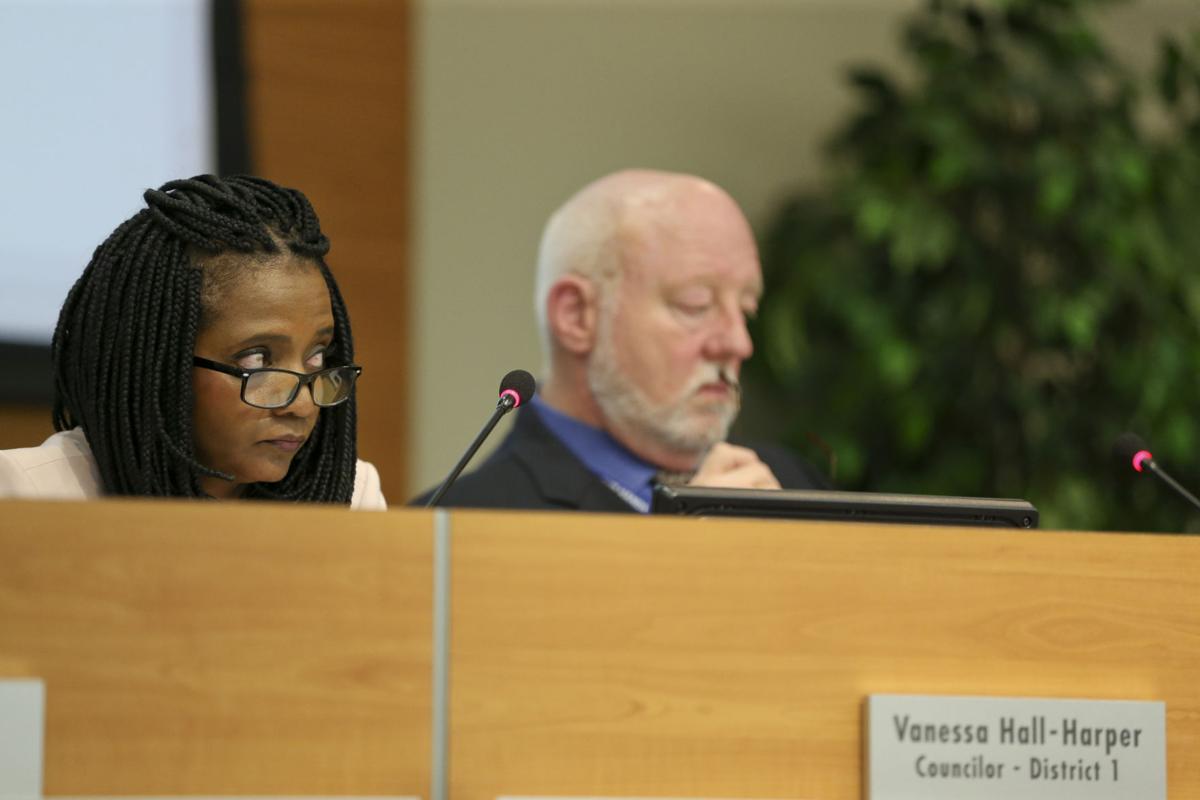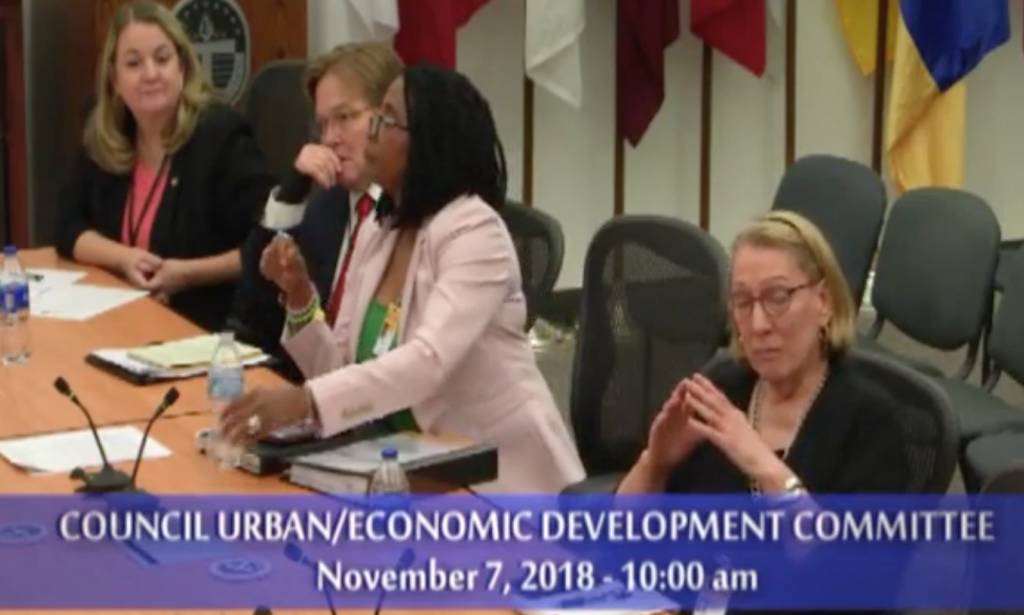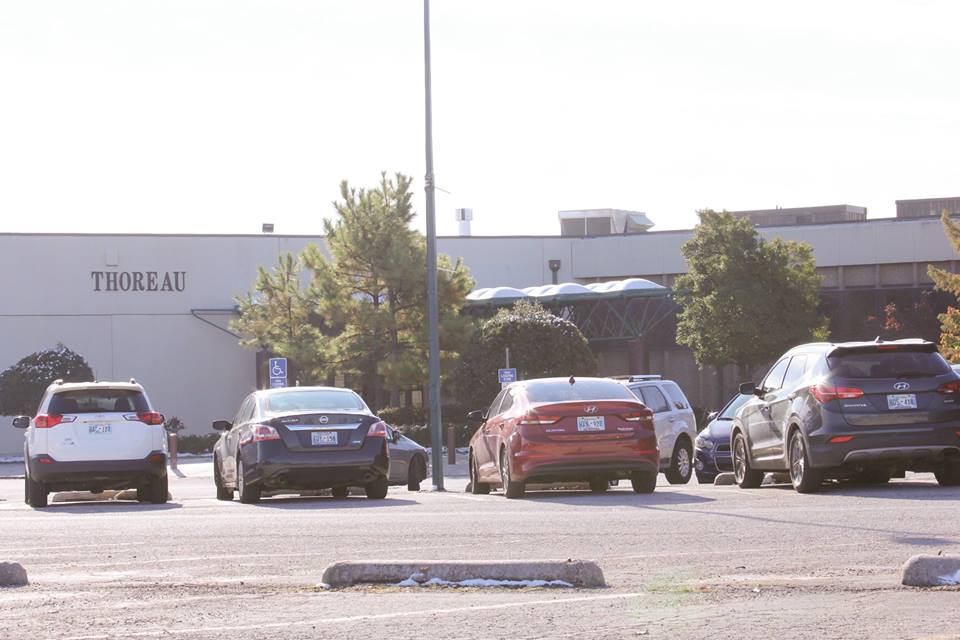
By Dylan Goforth
www.readfrontier.org

Vanessa Hall-Harper, Tulsa’s lone black city councilor, told The Frontier that comments made by District 3 interim councilor Karen O’Brien on Wednesday defending the legacy of Tate Brady were “white privilege in action.”
O’Brien, who replaced the late David Patrick following his sudden death in September, asked on Wednesday during an Economic Development Committee meeting why the focus was on Brady’s Ku Klux Klan membership rather than the “many many other good things” he had done.
The comments were made during a discussion over changing the name of M.B. Brady Street to Reconciliation Way. The street — previously named Brady Street — was first renamed in 2013 after it was discovered that Brady, an influential early Tulsan, had also been a member of the KKK and allegedly played a role in the Tulsa Outrage.
Brady later left the KKK and backed anti-Klan candidates in future elections.
Hall-Harper, the District 1 councilwoman, was seated next to O’Brien during Wednesday’s meeting and told The Frontier that she was disappointed in O’Brien’s comments. O’Brien’s district sits directly east of Hall-Harper’s and also includes a large swath of north Tulsa.
“I wanted to say something, it was on the tip of my tongue,” Hall-Harper said. “But it would not have fared well at that time.”
Video of the meeting shows Hall-Harper appearing to roll her eyes after O’Brien asks about the “many many other good things” Brady had accomplished. Hall-Harper then took a drink from a water bottle and remained composed as the discussion continued.
“I was just in total shock,” she said. “The only thing that came to mind was would you say the same about Adolf Hitler? Some people thought he was a great person, are you kidding me? Where’s your humanity in acknowledging this person? … I was shocked.
“Sadly, she actually doesn’t think there’s anything wrong with what she said. It’s white privilege in action is what it is. Living in your world and not considering anyone else.”
Brady, who moved to the area in 1890 as a 20-year-old, signed the charter to incorporate Tulsa and built the Brady Hotel. Cain’s Ballroom originally served as a garage for his vehicles, and a star on the pavement outside the venue’s front door still honors Brady.
However he also served as a watchman during the 1921 Tulsa Race Massacre.
While O’Brien, who could not be reached for comment, championed the “good things” Brady did as a Tulsan, Hall-Harper disagreed, saying Brady did good things “for white Tulsa.”
“He didn’t do good things for black Tulsa,” she said. “He used hate and racism to do it. I don’t consider that good and my community doesn’t consider those things good. They were done to the detriment, annihilation and destruction of some to the benefit of others.”
Discussion on the potential name change, which outgoing District 4 councilor Blake Ewing proposed last month, was tabled until Nov. 28. Ewing previously told The Frontier that the 2014 compromise in which the street was renamed after M.B. Brady, a Civil War photographer with no connection to Tulsa, was one of his “biggest regrets.”
Hall-Harper said that she would vote in favor of the change, despite acknowledging that it was a mostly symbolic gesture. M.B. Brady Street travels through downtown and into the historic Greenwood District, the site of the Tulsa Race Massacre.
“In general I do support the name change, but I do understand the feelings of some people in the community who feel like it’s just symbolism and just for show,” Hall-Harper said. “To a very large degree I agree with that as well, I just believe this is a very small step in working toward reconciliation.”
Hall-Harper said some of her constituents are not in favor of changing the name, feeling that it is a move meant to appease black Tulsans rather than to actually reconcile the city’s racist past.
“We do need to take more significant steps,” she said. “There are things in this community that are happening I believe in order to hide the city’s racism with the anniversary of the Race Massacre coming up. But as a city councilor I feel like this is an opportunity to remove (Brady’s) name from the city and that’s an opportunity I can’t pass up. I don’t know if the name change will pass or not, but I have a vote in removing his name and I can’t not do that.”
She added that she believes Ewing’s proposal is “coming from the right place.”
“I believe he’s doing this because he truly believes a mistake was made (with the compromise),” she said.










